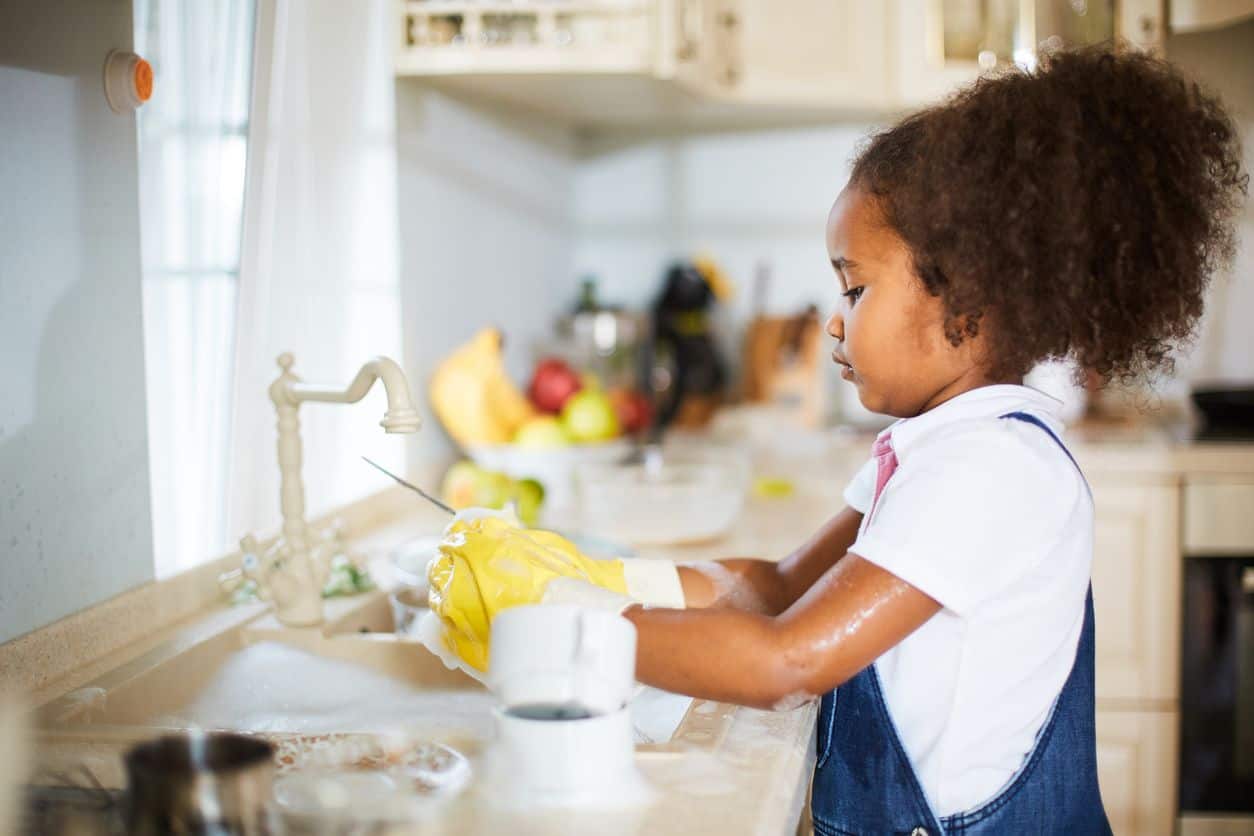Household tasks according to each age stage may be largely numerous, but the mother may be confused here. Is it necessary to involve the child in these tasks, is it useful for him or is it better to let him have fun and play only, and if you think about it, you may find Yourself more confused ..
What household chores can a 5-year-old be responsible for? What about an 8-year-old child? When can children start learning how to wash their own clothes? Use the age-appropriate routine list as a guide when determining which tasks your child will be able to successfully accomplish, which is what we are talking about in this article so read on.
Considerations when involving the child in housework
Keep in mind that all children are different and that age is not the only factor when determining household tasks according to each age stage, in addition to age, think about the level of maturity, physical ability, and attention when choosing the appropriate works for your children, and note that for the older age groups, you can specify Home Based Businesses for Younger Categories To create a suitable list, prepare your child for success and choose the right and workable amount of chores and timeline to complete them.
Household tasks according to each age stage
Work appropriate for two to three years of age
Young children love to help with chores, and while helping them may not always be as helpful as we hope, keeping their enthusiasm and help habits on the list is worth the extra effort.
Many young kids love to see a visual reminder of their success, so creating poster layouts is a great option, although works may only be completed by helping you every step of the way, you create positive habits for children to find Household tasks according to each age stage and help others to The way they work.
- Putting their toys in place
- Fill a cat or dog food bowl
- Putting clothes in a dirty clothes basket
- Wipe the surface off the dirt
- Collect books and magazines on shelves or tables
- Help make cleaning and tidy up the beds
 Works suitable for ages four and five
Works suitable for ages four and five
The great thing about pre-school children is that they are still somewhat eager to help and so it is important to understand Household tasks according to each age stage.
Preschoolers love single time with adults, if they devote some time to teaching new business one by one, they usually love it.
Many children of this age are willing to do housework without constant supervision, and they love rewards. Try to use a sticker layout that allows them to increase more rewards.
For some pre-school children, tying business versus allowance is a great choice, this can also boost independence by letting them choose a reward.
- Organize their bed without supervision
- Tables clear
- Weeding
- Use a vacuum cleaner to collect crumbs from the room
- Interest in plants
- Washing plastic dishes while supervising with the help of an older brother
- Prepare the table with the help
- Bring light groceries
- Sort white washing and colors before washing
- Matching socks together
- Clean the dust with a cloth
- Caring for animal foods and water
Housework for ages 6 to 8
Although enthusiasm for housework may fade to school-age children, they do have other recovery traits that work well in housework.
Most school-age children have an overwhelming desire to be independent, and parents and caregivers can guide children to become self-sufficient in their businesses by using home-based business plans to track their responsibilities.
Note completed tasks as this will help motivate children to continue working on Household tasks according to each age stage.
- Floor wiping
- Assist in preparing packed lunches
- Performing the patio preparation
- Clean their bedrooms
- With the least amount of supervision put the groceries in place
- Loading and empty the dishwasher
- Prepare dinner
- Prepare their own meals
- Clean the table after meals
- Empty internal garbage cans in the trash can in the kitchen
Home chores for ages 9 to 12
Kids of this age will appreciate a specific schedule and expectations, for Household tasks according to each age stage. So when you put more work on the child’s shoulders at this point, you may find the child upset and unwilling to complete this.
If you can create a table or system with just a few entries, you will get a smooth transition, it is better to find a system that suits your family, try not to change that and you should pay attention to the simple sequence in the task mode.
Part of this system should address negative rewards and consequences so that these results are developed and understood in advance.
- Help washing the car.
- Bathroom cleaning.
- Dishes washing
- Loading the dishwasher without assistance
- Family car wash
- Preparing easy meals without help
- Use a washing machine and dryer
- Run the washer and dryer.
Home chores for ages 13-18
Most teens are able to handle almost any chore at home as long as they are properly educated, one thing that you should be sensitive to is scheduling teenagers’ tight time.
Just as we are overwhelmed when we have a lot to do, teenagers can find themselves struggling to maintain an uncontrollable workload, watch the teenager’s schedule and school obligations; Adjust routines and activities accordingly.
- Replace light bulbs and vacuum cleaner bags.
- Doing their laundry (or family washing).
- Windows wash.
- Clean the fridge and other kitchen appliances.
- food preparation.
- Preparing grocery lists.
- Clean the fridge
- Help in the kitchen in terms of deep cleaning of appliances and safes
- Toilet cleaning, sink
- Bathing independently (for short periods)
- Mow the lawn for pets independently
- Serving more sophisticated meals
- Doing the little shopping alone
- Help parents with home repairs or simple cars
Keep in mind that children ripen at the speed that is specific to each child and set them apart, and not all children will be able to do advanced household chores of the same age.
Likewise, some children may be willing to perform more difficult tasks at a younger age among Household tasks according to each age stage.
You are in the best position to supervise and assess your child’s needs and abilities, and you can develop children through the most challenging actions where they master the basics.
It can be easy to allow children to continue doing the same jobs because they are good at them, but submitting new jobs at regular intervals will actually benefit them, establish a “training period” with new works while teaching them the details of the new assignments.
read also Jealousy among children
for more information press here





